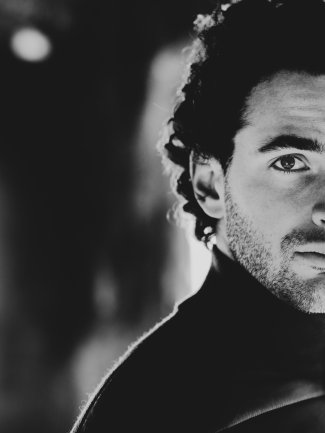
A CONVERSATION WITH… NOAH MAX
27/5/2024
A conversation with… is a Birdsong blog series
What was your most formative musical experience as a child?
At the age of seven I was introduced to the composer, lecturer and pianist Melanie Daiken. Mel was a student of Messiaen in Paris, where she was friendly with Samuel Beckett. She was a radiant, effusive, erratic character, and as for her music — well, I had no clue music could sound like that! After Mel’s passing in 2016 I wrote a string trio dedicated to her memory entitled Sojourn, which was awarded the Clements Prize in 2021. That work was a turning point in my life: once it was complete, I dedicated myself to writing music and never looked back.
You’re also an accomplished painter and writer – how do these other art forms influence your composing life?
There are times when I feel more like a playwright or a poet than a composer. My first language happens to be music, so my emotions and thoughts tend to crystallise in musical form. Line, shape, colour, texture, chiaroscuro are crucial to the process as well; the physical motions of painting are strikingly similar to those of conducting. Every art form must be linked somehow, though perhaps these connections are not for us to grasp. If we could, life would be less fun!
Do you feel your music has a signature style or approach? If so, how would you describe it?
Everything in my life seems to transform at quite a clip and my musical style is no exception. The sheet of empty manuscript paper always provokes a cold sweat and a twist in my stomach: I approach it with no preconceptions and no idea what might happen next.
That said, my roots do make themselves felt in my work. There is my elegiac, pastoral English temperament in sharp contrast with my energetic Viennese ancestors: Gustav Klimt and Egon Schiele, Sigmund Freud and Arthur Schnitzler, the two Viennese Schools. Meanwhile my Jewish background put me in touch with the Old Testament, the most inexhaustible and impenetrable wellspring of creativity that humanity has yet produced.
Can you tell us about an upcoming project?
John Boyne has just included an excerpt from my fourth string quartet in his appearance on BBC Radio 4’s Desert Island Discs. The recording is from a new album featuring the Tippett Quartet and Sir Michael Morpurgo which will be released on Toccata Classics in the autumn.
Three world premieres are fast approaching this summer; strangely, they fall within days of one another! The first is a cycle based on Carol Ann Duffy’s love anthology Rapture on 19 June; then follows Symphony No. 1 with the London Mozart Players on 21 June; finally, a new cello concerto with Echo Ensemble on 26 June. That will be a week to treasure.
It has been a thrill to begin working with the Birdsong team on a number of projects now in the pipeline. We cannot wait to share more about these in due course.
What are you listening to at the moment?
Leoš Janáček, Igor Stravinsky, Sir Michael Tippett: three iconoclasts who wrote precisely what they intended, no matter what anyone else said or thought. I am also hooked on the Spanish surrealist painter and sculptor Joan Miró as well as one of Philip Roth’s epic, transgressive novels — his prose is so iridescent that I actually cannot put it down!
What’s something we might not know about you?
My earliest ambition was to be a film director and documentarian. As a teenager I produced more than 200 shorts, worked as a runner on movie sets and did several stints as an intern at Working Title Studios. The highlight was having lunch one afternoon with Walter Murch, editor of The Godfather trilogy, The English Patient and Apocalypse Now.

